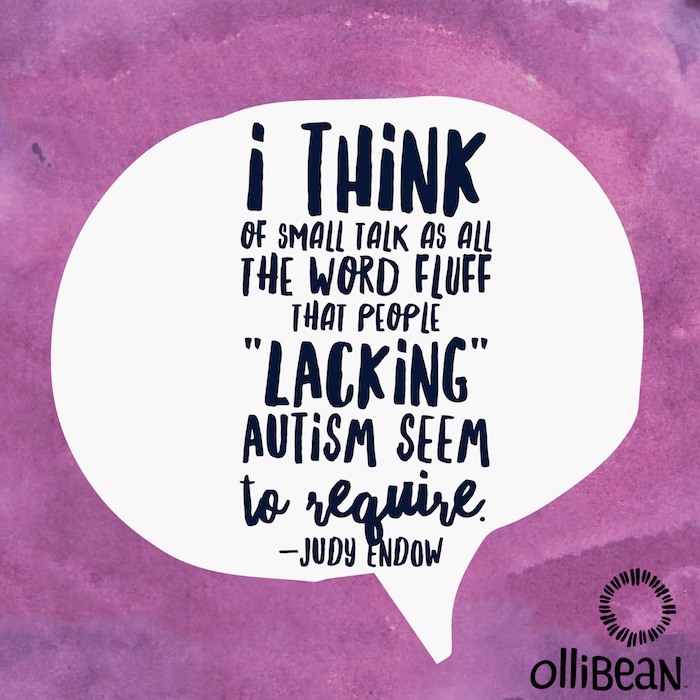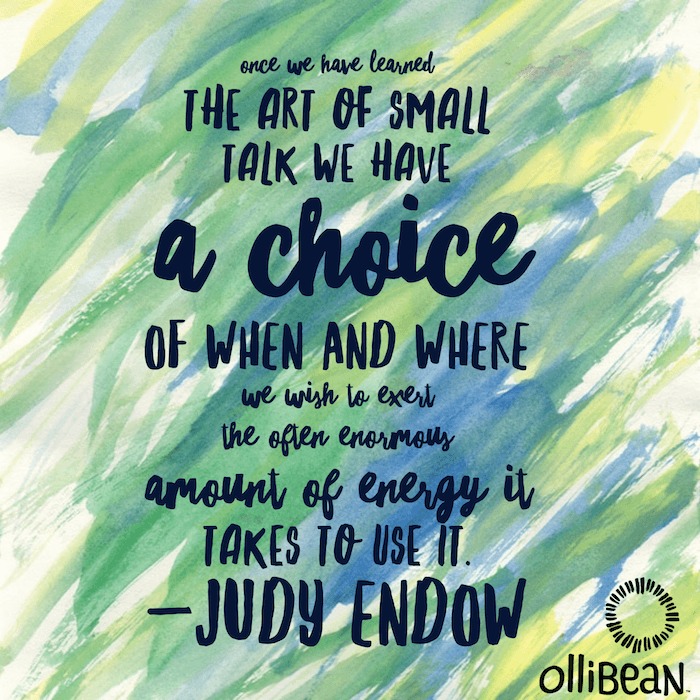by Judy Endow
As an adult with autism small talk is the most difficult of all communication and yet it is likely the most important communication skill when it comes to developing real relationships with other human beings.
I think of small talk as all the word fluff that people “lacking” autism (love to say it that way!) seem to require. I was reminded again last night when a dear friend popped out to chat online with me. Here is how our conversation started:
Susie: hey
Judy: what
Susie: “what?” geez, was just saying hi
Judy: STARTING OVER!
Judy: hi back
Judy: PS Forgot the fluff. Guess I skipped too much blah blah blah. Forgive me?
Susie: LOL no worries
Because Susie is a good friend the conversation moved on. But, consider this – Susie has known me for years. She understands I am not wired to automatically engage in small talk just like I understand Susie is wired to expect small talk to occur. Since there are more Susies than Judys in the world the onus is on me. If I want real friendships I need to engage with other people in a way that shows them I value their friendship. This makes small talk a BIG deal!
People expect small talk. It is part of that ever illusive hidden curriculum – all information neuro majority people are wired to naturally pick up so never need to be taught. Autistic people, on the other hand, have a neurology that does not permit them to automatically pick up all the hidden curriculum that everyone else knows, but nobody has ever taught – such as small talk (Endow, 2012). And because small talk is expected it is a BIG deal in the social arena when you don’t deliver it!
Small talk is also a BIG deal in when it comes to business relationships. It is difficult for me to understand why, when a boss says, “Time is money” meaning that workers should not waste time he would then EXPECT all workers to engage in a certain amount of small talk with every business transaction (Myles, Endow & Mayfield, 2013). This just goes to show that small talk is a very BIG deal!
Small talk is such a BIG deal that we are even expected to carry on with perfect strangers using small talk! This is particularly befuddling to me, but it is true that the expected polite thing to do is use the fluff words of small talk everywhere you go. Yesterday I did errands and watched for the small talk. It fell out of the mouths of the grocery checker, the postal worker and the bank teller (even it was the drive through!).
Because small talk is such a BIG deal I have made it my business to learn about it and become proficient enough to use it so as to fit more comfortably into the world around me, having more positive encounters with strangers and business people along with better relationships with close friends. Here are some things that have helped me:
Watch for small talk: For many weeks I intentionally watched for small talk when going on errands, working and spending time with friends. Once I started watching for it I was able to identify it. This helped me to understand what sorts of things were considered small talk.
Find appealing aspects of small talk: For example, even though I find small talk difficult I do very much enjoy the predictable repeating pattern – basically, you can count on small talk to be part of most conversations so the pattern repeats with each conversation regardless of the conversation partner.
Identify the small talk topics: The topics I have identified include the weather, the weekend and compliments. It has been helpful to me to know these topics that usually come at the beginning and sometimes at the end of a conversation are small talk in that I don’t need to pay close attention or remember all the details. This allows me to focus the more important words that usually follow the small talk in business transactions (Myles, Endow & Mayfield, 2013)
Writing Scripts Ahead of Time (Endow, 2006, pg. 52): My brain cannot retrieve something it hasn’t stored. Writing scripts ahead of time allows my brain to store the generic small talk fluff words so that I can pull them up and use them without needing to waste the energy it takes to create my portion of each small talk transaction that my brain otherwise reads as novel. I have scripts for the weather with a multiple-choice feature to accommodate current weather events. Here is one small talk weather script I use: “How are you liking this (heat, cold, wind, rain, sunshine)?
Play acting scripts: It will not work to simply repeat rote small talk scripts. You will come off looking very odd. I have found it helpful to think in terms of play-acting (Endow, 2012). This allows me to match the information of the script to the real life setting. For example, to a friend I might ask, “So, what’s the scoop on your weekend?” With a business acquaintance I might ask, “Did you have a nice weekend?”
Build word sandwiches: Whenever I have something important to say I pop up a picture of a sandwich. This shows me that my important words are the filling, but I need to build the sandwich, with the bread being the small talk words. The sandwich pop up reminds me to start and end my important words with small talk. It is amazing how much better people like my ideas when I sandwich the idea in small talk!
In conclusion, remember: if you teach communication or social skills to folks on the autism spectrum please embed the art of small talk along the way. As autistics, our learned communication strategies fall flat with out small talk. Many of our learned social skills put us in a position next to other human beings because we have learned their ways and are able to look like them. But if we have not learned the art of small talk we appear awkward, are easily dismissed and sometimes teased. Once we have learned the art of small talk we have a choice of when and where we wish to exert the often enormous amount of energy it takes to use it. It has been a huge positive in my life to have this choice. Therefore, I encourage you to please teach us the art of small talk because it is a BIG deal.
REFERENCES
Endow, J. (2012). Learning the Hidden Curriculum: The Odyssey of One Autistic Adult. Shawnee Mission, KS: AAPC Publishing.
Endow, J. (2006). Making Lemonade: Hints for Autism’s Helpers. Cambridge, WI: CBR Press.
Myles, B. S., Endow, J. & Mayfield, M. (2013). The Hidden Curriculum of Getting and Keeping a Job: Navigating the Social Landscape of Employment. Shawnee Mission, KS: AAPC Publishing.









Very helpful! Thank you for including notes for further reading.
[…] The Big Deal about Smalltalk by Judy Endow. Demystifying why non-autistic people engage in smalltalk, and how and why autistic people can learn to do so. […]
[…] Originally written for and published by Ollibean on September 22, 2014 […]
As a psychiatrist working with neurotypicals and neuroatypicals, I found your article very helpful !
This is great, Judy! I am pretty confident I can follow these points… :-) Thanks!
I like your idea of the sandwich …. I always learn something from your blogs Thanks !